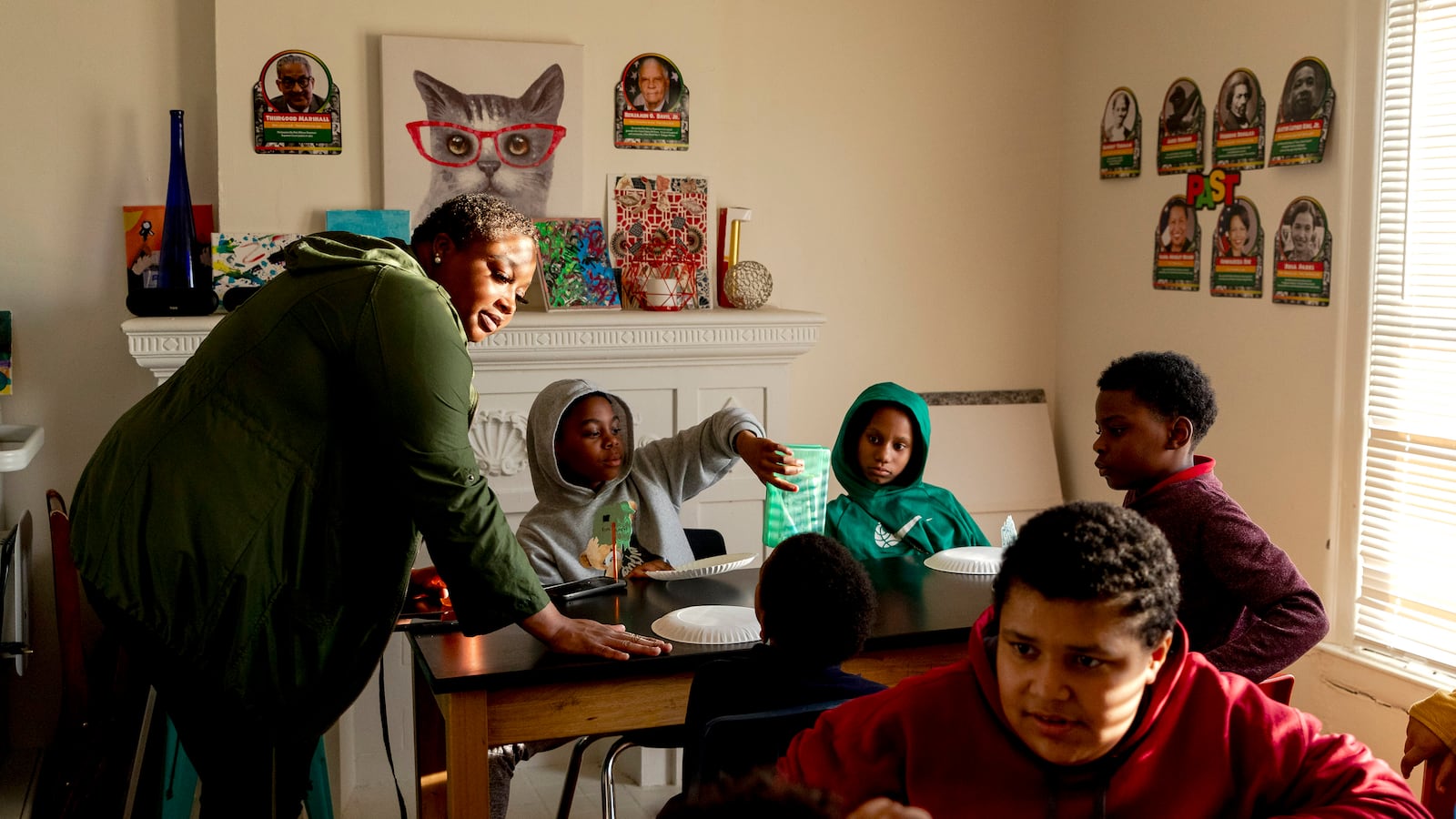In a cozy second-floor room at Brilliant Detroit’s Morningside facility, a small group of moms, grandmas, and caretakers learned about the importance of singing to the children in their lives.
Surrounded by children’s art and photos of notable Black Americans, the women listened, chatted, and laughed as they participated in what’s known as a “Six-a-Day” workshop.
The workshops, held weekly in multiple locations by the nonprofit Detroit Champions for Hope, teach family and caregivers to help young children build early learning skills through six daily practices: encouraging, hugging, talking, singing, reading, and playing.
Sparkle Berry, a community outreach coordinator for Detroit Champions for Hope, led the workshop. She told the assembled women that singing is one way to help kids exercise the “muscle” of the brain.
“Something I tell my kids is that you take care of your body, your brain, and your mind when you’re young so your brain, your mind, and your body can take care of you when you’re old,” she said.
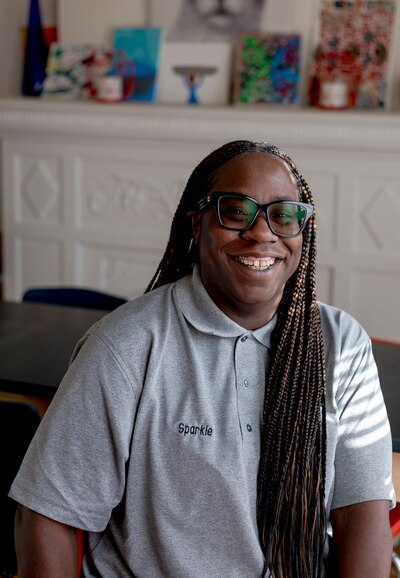
The Six-a-Day workshop is just one small facet of the sprawling work of Hope Starts Here, an ambitious early childhood education initiative launched by the Kresge and W.K. Kellogg foundations in 2016. The foundations each invested $25 million into implementing six key goals, or “imperatives,” that seek to improve Detroit’s early child care system by 2027. (Kresge and Kellogg foundations are Chalkbeat funders. Learn more about our funding here.)
Nearly eight years after the plan was announced, Hope Starts Here boasts numerous achievements – including opening a new early childhood education center, supporting families and caregivers, and helping child care centers stay afloat – despite setbacks that occurred because of the pandemic.
Now, leaders are looking ahead as state lawmakers push to fulfill Gov. Gretchen Whitmer’s promise of free preschool for 4-year-olds statewide regardless of their family income.
A collaborative response to complex problems
Hope Starts Here originated as a response to a number of alarming indicators for early childhood in Detroit, including perinatal health disadvantages, low-performing schools, high child care costs, and a lack of licensed child care seats.
The initiative was formally announced in 2017, but community engagement and planning began more than a year before and included 125 community “listening sessions,” which gathered input from 18,000 Detroiters, including families and caregivers, child care providers, and educators.
In November 2017, Hope Starts Here released “Detroit’s Community Framework for Brighter Futures,” a road map to make Detroit “a city that puts its young children and families first” by 2027. Its six numbered imperatives to accomplish that goal were to promote children’s health, development, and well-being; support parents and caregivers as children’s first teachers and champions; increase the quality of early childhood programs; guarantee safe and inspiring learning environments; create tools and resources to better coordinate systems that impact early childhood; and find new funding for early childhood while better using existing resources.
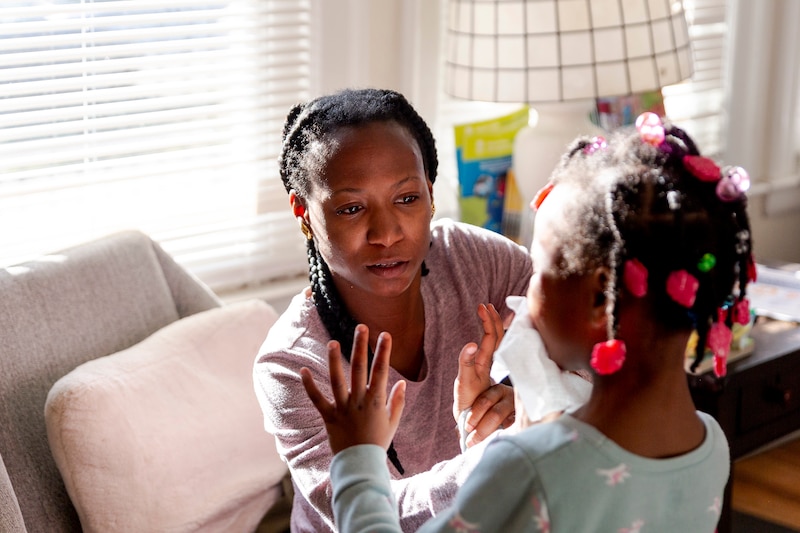
“The framework was brilliant because there is no one lever that you can pull to make this thing work,” said Denise Smith, former implementation director for Hope Starts Here. “The system is affected at all these leverage points, and so if you’re not focusing on how all of them contribute, the system is effectively not going to change. You just corrected one piece. It’s like putting pressure on a pipe. If I patch this hole, the pressure is still there. It’s gonna come out somewhere.”
Kresge and Kellogg’s role in the initiative has focused on bringing together existing organizations and advocates that were already pursuing similar work, and funding them to carry out the imperatives. Eileen Storer Smith, a program officer at Kellogg, said the initiative has emphasized a model that allows those organizations and advocates to set their own agenda rather than a “traditional top-down model.”
“It’s just a way to coalesce that work and to coordinate it,” she said.
Funding child care providers and connecting families to subsidies
Hope Starts Here’s approach has yielded notable achievements over the past six years.
IFF, an organization that works to strengthen nonprofits and the communities they serve, acted as the lead developer for the Marygrove Early Education Center, which opened in 2021 and serves children from 6 weeks old to 4 years old. The organization is currently developing the McClellan Early Childhood Education Center in the Gratiot Woods neighborhood, to serve children from birth to age 5.
Both centers are “models ... to help elevate folks’ understanding of what a high-quality early childhood facility looks like,” said Tara Townsend, IFF’s social impact accelerator president.
The initiative also helped bring in $23 million in childhood stabilization grant funding to support child care providers during the COVID-19 pandemic, brought in $5 million in public and private funds to improve or expand learning facilities, helped over 3,500 families obtain state child care subsidies, and helped over 1,000 families access the federal child tax credit, according to a summary of Hope Starts Here’s work prepared by Kresge and Kellogg,
The initiative’s “Imperative Two,” which focuses on supporting parents and caregivers as children’s first teachers, is perhaps most emblematic of the initiative’s community-oriented approach to Detroit’s early childhood environment.
Denise Smith described it as “the first imperative on the ground,” growing out of the work of Impact Detroit, a coalition of organizations focused on improving Detroit’s neighborhoods. Impact Detroit played a key role in Hope Starts Here’s early community engagement work, and some of its members went on to form Detroit Champions for Hope. The nonprofit is dedicated to carrying out Imperative Two’s goals, with Kresge and Kellogg as its primary funders.
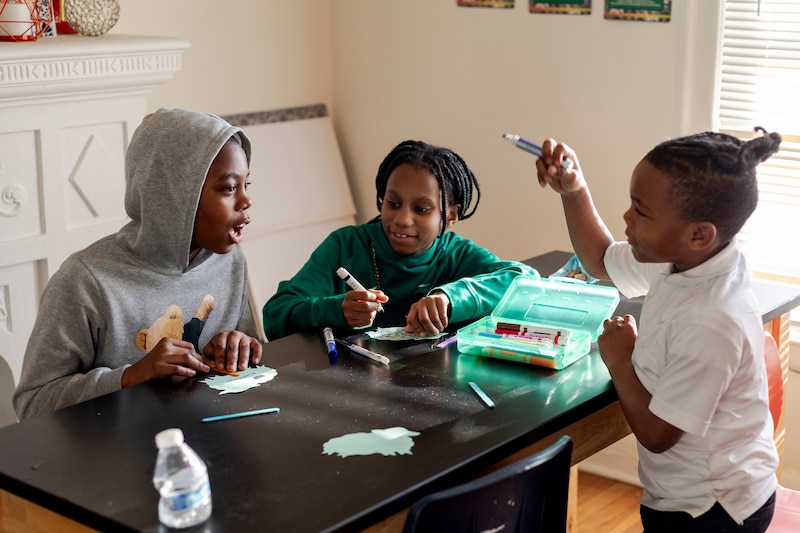
Relying on feedback from parents and caregivers, Detroit Champions for Hope contracts one community outreach coordinator and about three community outreach specialists for each Detroit city council district. Hired to represent the neighborhoods where they live, the coordinators and specialists lead Six-a-Day workshops. They’re also available to help caregivers solve other child care struggles, such as finding centers with available seats.
Detroit Champions for Hope reached a total of 5,560 people through 98 outreach events in 2022, the most recent year for which data was available from the organization.
Furqan Khaldun, partnership coordinator at Detroit Champions for Hope, said his organization seeks to empower future child care experts and advocates, and he’s proud of the “little victories” community outreach coordinators and specialists have achieved.
Berry, who led the workshop at Brilliant Detroit, is an example of that.
When COVID hit, she left a job at McDonald’s, where she’d worked over 15 years, to take care of her children. As she sought remote work, she found a job posting from Detroit Champions for Hope. She said Six-a-Day workshops taught her “a lot of patience” with her own kids, and she enjoys spreading that knowledge to others as a community outreach coordinator. She’s also since begun pursuing a bachelor’s degree in social work at Wayne State University. Berry said Hope Starts Here “definitely set [her] on a different path.”
“I had a very angry, yelling mom,” she said. “And I always said I wouldn’t be that yelling mom. ... So these tools teach me how to not be that way [and] teach me other ways to use my voice without yelling.”
Detroit Champions for Hope is now preparing to establish a dedicated physical office, a plan that was put on hold during the pandemic. It’s also working with Data Driven Detroit to establish infrastructure to track and share data about how much Detroit parents read to their kids and participate in educational advocacy work.
Khaldun sees Detroit Champions for Hope’s work as crucial to bridging Detroit’s child care “seat gap,” estimated at 23,000 seats, according to Hope Starts Here’s framework.
“The best programs in the country [have] added maybe 1,000 seats per year to close the gaps,” he said. “... So that will take 20 years, if we do the math. And so what can we do to help families and children while they’re getting their seats built?”
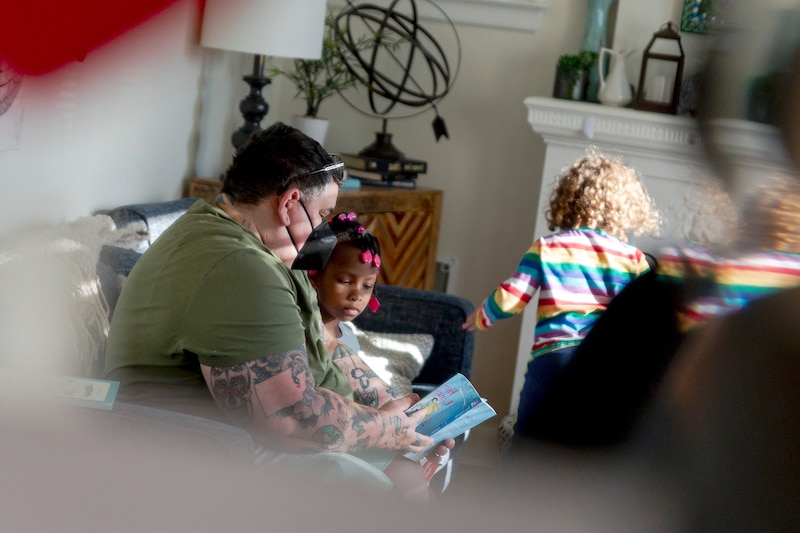
Tackling the seat gap and universal prekindergarten
In the past two years, Hope Starts Here has undergone changes in leadership and organizational structure, including Smith’s departure last summer.
The initiative briefly adopted a heightened focus on closing the seat gap in child care, prompted in part by IFF stepping for a short time into a coordinating role for all six imperatives. Smith said she was originally drawn to Hope Starts Here’s “comprehensive” approach to early childhood development in Detroit. She was disheartened by IFF’s focus on closing the seat gap as a key goal for all imperatives.
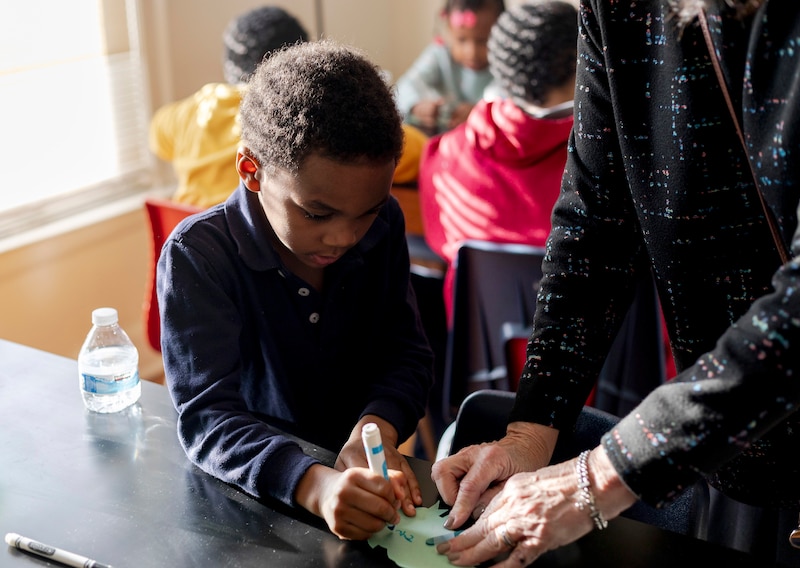
“Having had the opportunity to invite organizations who are dedicated to the city, in their own respects, and work with them over these years, I will say that we do have a force that really could effect change,” she said. “It’s just hard when you aren’t given the space, and maybe encouragement, to continue to work in that way.”
Now IFF is stepping back from its oversight role, while Kellogg and Kresge will “serve in a coordinating capacity across various Hope Starts Here backbone functions,” Yazeed Moore, Kellogg’s director of Michigan programs, said in a statement. Those functions include serving as a liaison between imperative leads, data collection and analysis, and communications and policy advocacy.
Moore said the shift honors the initiative’s original vision of “a community-shaped framework implemented in Detroit.” It also allows imperatives that aren’t directly related to closing the seat gap to refocus on their original goals.
“The seat gap will still be a major priority, but in tandem with outcomes around maternal and child health, kindergarten readiness, and other key outcome areas that are connected to, but not directly contributing to, the seat gap,” Moore said.
The seat gap could also narrow under Whitmer’s proposal for universal pre-K, but that raises concerns for some Detroit child care providers.
Denise Lomax, owner of Child Star Development Center, and Nina Hodge, owner of Above and Beyond Learning Childcare Center, fear a universal pre-K system will jeopardize their already stressed operations. Lomax said that under the new proposal, independent child care centers like hers will need to offer state programs like Early Head Start and the Great Start Readiness Program “to be sustainable, to even pay [for] staffing.”
“If you don’t have these programs, you’re not going to survive,” she said.
Townsend, from IFF, said the governor’s proposal is a realization of something she considered “sort of a stretch goal” for Hope Starts Here. But she said it’s important to pursue a thoughtful rollout so the process “doesn’t inadvertently cannibalize the ecosystem.”
“Investing in preschool, in community-based providers, and not just in school districts, really is one of the major ways in which to do that, so that those dollars actually aren’t taken out of community-based providers, so that they can afford to stay in business,” she said.
Hadassah McKnight, director of Child Star Development Center, sees a place for Hope Starts Here in the uncertain road ahead for early childhood education in Michigan.
“Do I think that they should continue their initiative? Because I’m an advocate for [early childhood education] and our partners, I would say yes. But do I think that that impact needs to be a bigger footprint? Yes, I do,” she says. “I think that they need to come into the facilities more, especially coming into the providers’ territory, and see what we go through, how we operate. They will get a better understanding of what goes on.”
Townsend said Hope Starts Here partners are currently embarking on a strategic planning process to “really hone in on a refined coordinated strategy,” particularly in light of Whitmer’s proposal.
She said the partners are also working to understand how much the pandemic set back their work. While the initiative is technically in its sixth year now, she said the pandemic’s effects may place overall progress at a much earlier stage. Many of Hope Starts Here’s implementation partners were heavily focused on responding to Detroit families’ emergency needs in the early days of the pandemic, and were further set back by the challenges of virtual schooling and presenting virtual events.
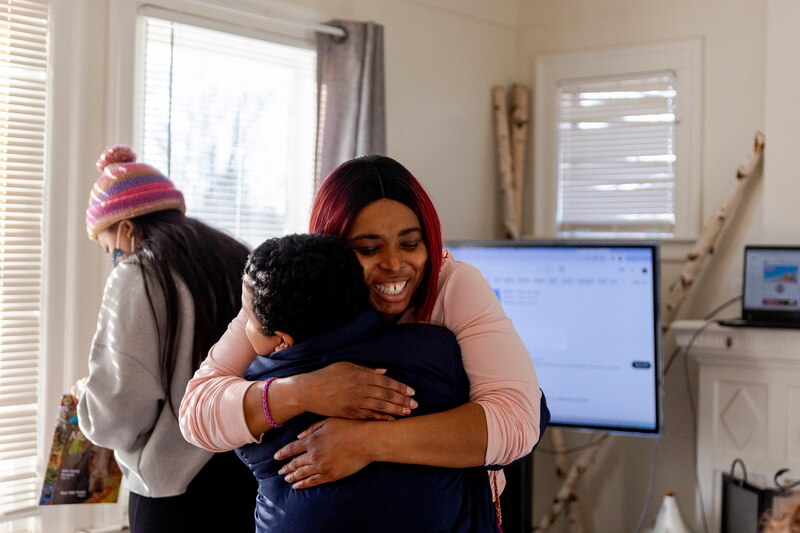
Although Hope Starts Here was originally designed as a 10-year initiative, both Townsend and Storer Smith anticipate a longer-term need – and longer-term financial support – for its work. Khaldun anticipates some “solid wins” by 2027, most notably a “blueprint” for how to continue building a stronger early childhood ecosystem in Detroit.
“It’s not the grand vision that we had 10 years ago, but I think it’s impactful,” he said. “And I’m proud of the work that we did.”

